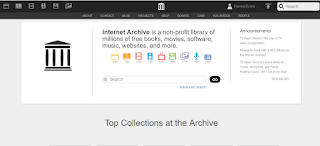 |
| Internet Archive Home Page |
Before we get to how to use this spectacular website, lets cover the basics. What exactly is Archive.org? Copying straight from their website: "Internet Archive is a non-profit library of millions of free books, movies, software, music, websites, and more.".
1: Use the Wayback Machine For Website Citations That Last
This is one of the features that makes Archive.org useful across many scientific disciplines.First things first, lets actually get to this ingenious tool.
Go to Archive.org and click on the web page icon in the very top left.
| Webpage Icon on Archive.org |
A link to the Wayback machine will then appear over the top bar. Click it.
 |
| Link to the Wayback machine |
You will be taken to a page with several options. scroll down until you see the 'Save Page Now" section in the bottom right hand corner. Pick a website that you want to save, maybe its a link to a a RootsWeb family history or a website with local history information. For the purposes of this tutorial, I will pick this list of archaic terms used in Czech causes of death. Paste it into the address bar and click 'save page'.
 |
| Save Page to Archive.org |
You will be taken to a page that looks like this:
 |
| Saved page |
Now, why is this so useful? If you copy the link to this page in the top address bar and use it in your citation, you can later see the page exactly as it was on the day you made the genealogical citation, even if the site was later deleted.
2: Find the Contents of Dead Links Using the Wayback Machine
This is becoming a problem more and more. Small websites rich in information are taken down, whether it be because the original owner passed away or because it just got too expensive to keep these websites up.
Here is an example. A lot of my Czech Family comes from Češnovice, part of the Parish of Pištín. So I went to the website of Češnovice, and at the bottom of one of the pages there is a series of links.
 |
| Links from the Češnovice Page. |
Wow, information on a bunch of the places my family is from relevant to genealogy, great right? Not so much. I clicked on the one for Pištín and was met with this:
 |
| 502 Bad Gateway |
Clicking the other links yielded the same result. So what should you do in this situation? Search the Wayback machine! get back to the Wayback machine link by clicking the web icon, same as you did before. Then paste your broken link into the bar and hit the enter key to search for the website in their archives.
 |
| Search the Wayback Machine |
That brings you to a page with information about all the times the website was saved. One of these will tell you the first date the website was saved on as well as the last date. Click the last date (circled in the picture below)
 |
| This page was last saved on March 5th, 2016 |
Unfortunately, in this case, I am brought to a slightly 404 page.
 |
| 404 error |
Luckily, this page had been saved several times in the past. In the timeline bar at the top, I click through the dates until I find one that works. My lucky date is July 4th of 2011. Now I am able to see the contents of the page, as well as click on the links to other pages on the site, with ease.
 |
| Working page on Archive.org |
3: Search
One of the best features of Archive.org is their collection of digitized books and texts. To best search this collection, use the search bar in the top right-hand corner and click "Search full text of books". if you don't do this it will restrict your results to ones where the name is included in only the title or author of the publication. I perform a search for 'Wesselowski' an uncommon last name that only relatives of mine have. For common names I recommend including other terms in the search, such as the location.
 |
| Search full text of books |
I scroll down in the search results until I see something that catches my eye. A Kansas fish and game pamphlet for my step 2nd great grandpa, Julius Wesselowski.
 |
| Kansas Fish and Game Pamphlet |
This brings me to the book itself, which I can flip through and search as I please. The entry for my step 2nd great grandpa Julius Wesselowski says he was given 800 fish by the fish and game departments for a pond he had. I don't know how he got this pond or where it was located but now I know that he fished as a pastime.
I have found all varieties of documents on Archive.org, including (but not limited to):
- Yearbooks
- Genealogies
- Compiled Biographies
- Pamphlets of Organizations
- Newspaper articles (including college newspapers)
Summary
Archive.org is a free tool every genealogist should use. Whether it be for creating lasting citations, viewing the content of broken links, or searching through unique documents, Archive.org should be one of your go-to resources.
Renee, Thank you for today's post. I used to visit Archive.org more often and somehow I forgot about it. I'll be busy searching today!
ReplyDeleteNo problem and good luck in your searches!
Delete